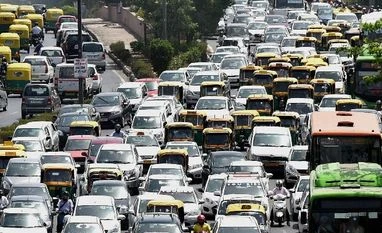There is no data to suggest that the odd-even scheme has led to a decline in vehicular pollution in the national capital, Central Pollution Control Board said on Thursday.
On being informed about this by the apex pollution monitoring body, the National Green Tribunal asked the Delhi government, which is implementing the second phase of the car- rationing scheme, why 15-year-old vehicles cannot be taken off the roads.
"Prima facie, there is no data to suggest that odd-even scheme has any impact on decrease in vehicular pollution. The fluctuations in PM10 and PM2.5 is due to weather and change in wind patterns," CPCB told a bench headed by Justice Swatanter Kumar said.
CPCB, which has been asked to analyse ambient air quality data in Delhi, told the green panel that scientific study is going on and it would submit its detailed report on vehicular pollution by May 2.
The tribunal then asked Delhi government to phase out 15-year-old vehicles from roads in order to contain the rising pollution in the capital.
"You are promoting the odd-even scheme so aggressively. Why don't you take off 15-year-old vehicles from the roads in the same fashion. Please do something," the bench said.
On the last date of hearing, the NGT had directed CPCB to independently monitor and record the data of ambient air quality in Delhi during the ongoing phase of the scheme.
Delhi Pollution Control Committee had informed the green panel that they have been recording the data independently for ambient air quality in the national capital in the context of the fortnight-long scheme that ends on April 30.
Both the teams (CPCB and DPCC) would independently also try to collect the data regarding the kind of vehicles which are permitted to ply and which are actually plying during this period including heavy motor vehicles, particularly those running on diesel.
"Department of Road Transport shall fully cooperate in compliance to these directions. The ambient air quality shall be collected from different places of NCT of Delhi including areas with high vehicular density and low density," the bench had said.
On being informed about this by the apex pollution monitoring body, the National Green Tribunal asked the Delhi government, which is implementing the second phase of the car- rationing scheme, why 15-year-old vehicles cannot be taken off the roads.
Read more from our special coverage on "ODD EVEN"
"Prima facie, there is no data to suggest that odd-even scheme has any impact on decrease in vehicular pollution. The fluctuations in PM10 and PM2.5 is due to weather and change in wind patterns," CPCB told a bench headed by Justice Swatanter Kumar said.
CPCB, which has been asked to analyse ambient air quality data in Delhi, told the green panel that scientific study is going on and it would submit its detailed report on vehicular pollution by May 2.
The tribunal then asked Delhi government to phase out 15-year-old vehicles from roads in order to contain the rising pollution in the capital.
"You are promoting the odd-even scheme so aggressively. Why don't you take off 15-year-old vehicles from the roads in the same fashion. Please do something," the bench said.
On the last date of hearing, the NGT had directed CPCB to independently monitor and record the data of ambient air quality in Delhi during the ongoing phase of the scheme.
Delhi Pollution Control Committee had informed the green panel that they have been recording the data independently for ambient air quality in the national capital in the context of the fortnight-long scheme that ends on April 30.
Both the teams (CPCB and DPCC) would independently also try to collect the data regarding the kind of vehicles which are permitted to ply and which are actually plying during this period including heavy motor vehicles, particularly those running on diesel.
"Department of Road Transport shall fully cooperate in compliance to these directions. The ambient air quality shall be collected from different places of NCT of Delhi including areas with high vehicular density and low density," the bench had said.
)